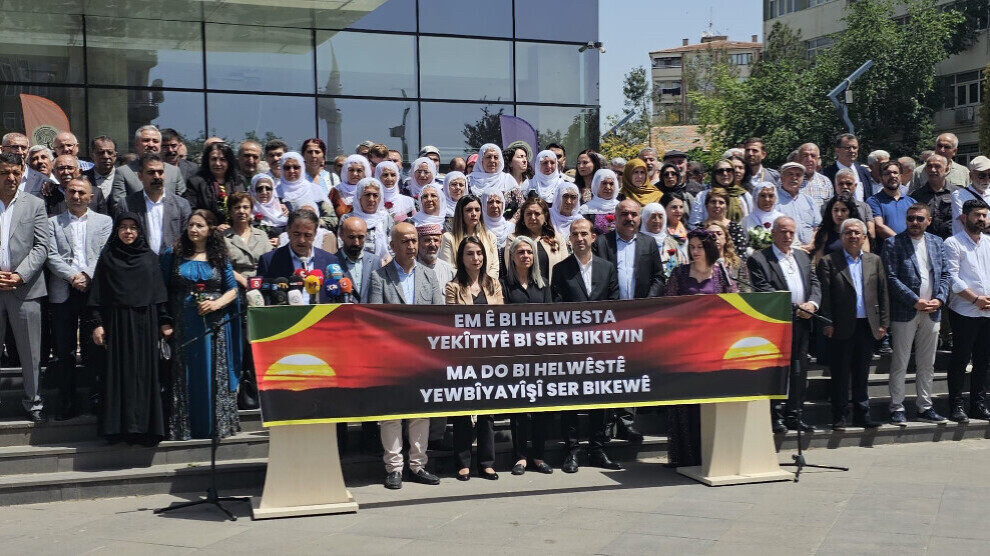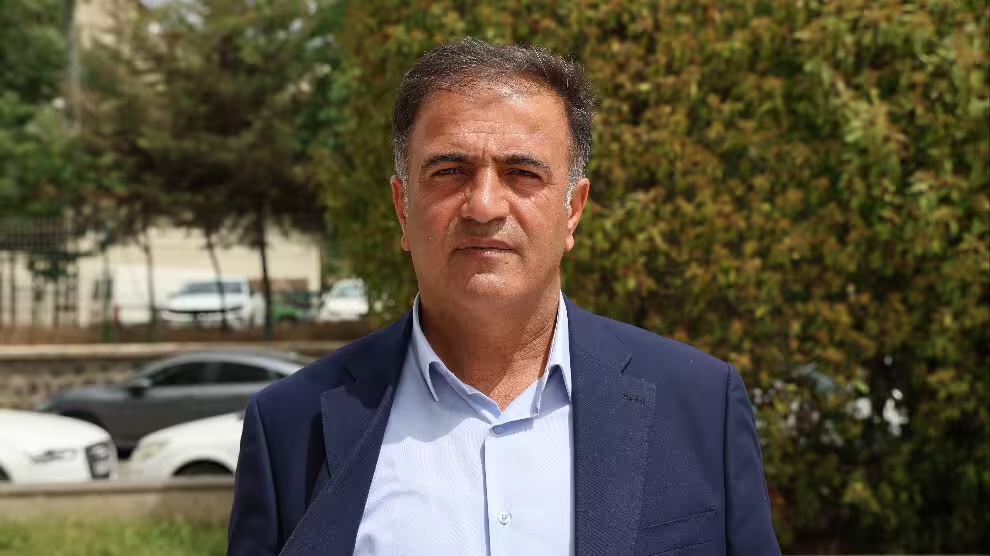Kamaç: Democratic Unity Initiative aims to be a common roof for all peoples
Mehmet Kamaç stated that the Democratic Unity Initiative seeks to unite Kurds and other communities in Northern Kurdistan under a common roof.
Mehmet Kamaç stated that the Democratic Unity Initiative seeks to unite Kurds and other communities in Northern Kurdistan under a common roof.

The Democratic Unity Initiative officially began its work on May 11. Formed by political parties, civil society organizations, representatives of faith-based and democratic institutions, and elected officials, the initiative has taken on the responsibility of defending the rights and demands of all marginalized, exploited, and oppressed social groups.
Speaking to ANF, Democratic Unity Initiative Co-Spokesperson and Peoples’ Equality and Democracy Party (DEM Party) MP for Diyarbakır (Amed), Mehmet Kamaç, emphasized that they are fully aware of both the significance and growing scale of their efforts, which they are undertaking in harmony with the spirit of history and the present. He underlined that they possess the faith, determination, and will to fulfill the requirements of their historic mission.

Mehmet Kamaç stated that the initiative has set out to resist all forms of repression, assimilation, and anti-democratic practices, and is determined to struggle for the construction of a democratic and free life. He explained that the initiative represents a collective stance and a long-term vision rooted in justice and social inclusion.
Result of 11 months of preparation
Kamaç stated that the Democratic Unity Initiative was the result of nearly eleven months of preparation and told the following: “This initiative is related with the Kurdistan Workers’ Party's (PKK) congress declaration. It was born out of a pressing need among communities in this region who have long been denied, ignored, assimilated, and whose very existence has historically been threatened. There was a need for a shared platform where their fundamental rights could be defended. The Democratic Unity Initiative is the product of this need. Throughout this process, we focused primarily on Bakur (Northern Kurdistan), with an emphasis on the Kurds. Our goal was to bring together all ideological, religious, and cultural currents within the Kurdish community under a common roof. However, Kurdistan is home not only to Kurds but to other identities and faith groups as well. These communities were also included in this process, and we held extensive discussions with them. During this eleven-month period, we held a meeting on January 11 with a limited delegation of seventy people. As we moved toward the declaration, we developed a roadmap and completed the missing parts of our work through joint efforts, reaching a consensus. After the January 11 meeting, we did not immediately announce a specific date for the declaration. We agreed to choose a meaningful and appropriate time. Eventually, the declaration came out on May 10 and 11. It was not a last-minute decision; the dates had been planned at least a month in advance.”
National unity is the key issue for Kurds
Kamaç remarked that the Democratic Unity Initiative encompasses a broad spectrum of society, particularly the Kurds, and continued: “For Kurds, the most fundamental issue is national unity. The issue of national unity has virtually turned into a tragic reality, rooted in centuries of history. One of the most pressing questions has been the consequences of the Kurds’ failure, or inability, to achieve unity. If, to this day, the fundamental rights of the Kurds are denied, if their existence is rejected, if their language is ignored or disregarded, if their geography has been fragmented, and if they have been deprived of the basic rights enjoyed by other peoples around the world, the main reason is the failure to form national unity. This was the most prominent item on our agenda, and nearly all components of the initiative were in full agreement on this matter.”
A struggle that also embraces other identities
Kamaç noted that as a people who have long been oppressed and denied throughout history, Kurds deeply understand the challenges faced by other ethnic communities in their geography. He stated: “Therefore, while defending their own rights, Kurds also see it as their responsibility to advocate for the fundamental rights of other identities alongside them. The broader scope of this initiative actually emerged naturally during the process itself. After all, in the geography of Kurdistan, there are Armenians, Turkmens, Arabs, and Assyrians, various ethnic communities live there. In terms of faith groups, there are Yazidis and Christians as well. While the vast majority of Kurds are Sunni, the existence of the Alawite community must also be acknowledged, a community that has suffered immense oppression and massacres throughout the history of the Republic, persecuted solely for their sectarian identity. This common roof, this shared stance, brings all of them together to defend everyone’s rights and freedoms. This inclusive vision is already reflected in the declaration. In fact, the declaration is just the beginning of this broader effort.”
Greater responsibilities now lie ahead of us
Mehmet Kamaç also spoke about the responsibilities related to the socialization of peace and stated: “Following the PKK’s dissolution, far greater responsibilities now fall on the Democratic Unity Initiative to achieve a democratic resolution to the Kurdish question. I believe we will carry out significant work in this regard. We are fully aware of what must be done. The scope of the Democratic Unity Initiative, which is grounded in democratic methods of resolution and shaped entirely around this principle, has expanded considerably. We are conscious of the scale and significance of the work we must carry out using these methods, in a way that aligns with the spirit of both history and the present. We are aware of the historical responsibility we bear, and we have the faith, determination, and will to fulfill it.”